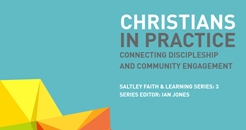 Christians in Practice
Christians in Practice
From a report 'Christians in Practice'
The Saltley Trust has recently published a report on Christians in Practice. The project was supported by the Church Urban Fund and other partners.
Christians in Practice is a research project exploring how Christians connect their discipleship to their engagement in communities and neighbourhoods. Based on research with over 1000 worshippers and 32 Anglican congregations in the Dioceses of Birmingham and Lichfield, it seeks to understand:
-
What Christians do to help others in their communities;
-
What motivates them to become involved and what the barriers to involvement are;
-
What connections they make between these activities and their faith;
-
In what ways community involvement helps them grow and learn;
-
In what ways they feel supported by their local church in this work, and how churches might support this better.
What were the findings?
Here is a summary:
Activities undertaken
As you would expect, almost every respondent had undertaken some sort of community activity during their lives and almost two-thirds were currently doing so. Informal community activity was the most common type of involvement e.g. helping a neighbour. Short-term community involvement is also commonplace e.g. charity fundraising. Participation in organised volunteering is widespread e.g. helping at a foodbank or a charity.
Making connections, for activities beyond and through church
Respondents were broadly willing to align their activity with their faith; this applied to activity beyond the church community as much as to activity through it. Many appeared comfortable with ideas of calling, with over half agreeing or tending to agree that the activities they did were a good fit with their calling. Interviewees described the connection between faith and activity in a wide range of ways, of which calling was just one.
Speaking about faith was the area fewest questionnaire respondents affirmed, but finding ways of sharing faith was mentioned by more than half of our interviewees, often as an area people that felt important but required careful reflection.
Community Activity as Formation
Respondents are largely positive about the role of community activity in forming them as Christians. The interviews suggest that such growth is understood mainly in terms of character and Christian disposition. Interviewees described having grown through stepping out in faith and encountering others, often in new situations. Community activity appears to be a potent way of helping Christians find new ways to develop and practice faith.
How far community activity ignites faith imagination or literacy seems less certain. In conversations about putting faith into practice most interviewees did not refer to the Bible in connection with their motivation or understanding of faithful activity. There may be scope to explore this further either in church communities or in research.
Church Activities and Community Activities
Respondents were generally happy with the way that they were involved. Many appeared to see scope for doing more but felt that existing personal commitments or reasons prevented that. A significant number served the community primarily through serving their church congregation, perhaps because to some extent they regard church itself as an activity to help others in the community.
What could my church do to help?
The respondents felt a broad range of help could be helpful in linking faith and community activity. Help discerning calling was the most often mentioned, and was prioritised by those who only mentioned one or two factors. Interviewees often spoke of the congregational or leadership culture as factors when asked to reflect on how their church supported them in their community activities.
Concluding reflections
Discipleship
Respondents are largely positive about the way in which community activity helps them grow as Christians. Such growth is frequently reported in terms of character and Christian disposition, and in enabling people to practice the faith they profess. Interviewees described having grown through stepping out in faith to leave their comfort zone and encounter others. There is scope to explore how individuals can be helped to explore the connections between their faith and their community engagement through Christian stories, images and language, given that most reflections of this kind in the interviews were of a relatively general nature.
Vocation
In Christians in Practice, respondents seem ready to recognise and respond to the language of vocation and calling, although interviewees only sometimes used it spontaneously, and often described their relationship with God in a range of other ways. The finding that many of the respondents wanted help in discerning their calling in relation to community activity may help church leaders imagine next steps. Given that many respondents were happy with the ways they engage in the community, there is scope for their testimony to be shared to encourage others.
Evangelism
An encouraging finding for some will be the respondents’ keenness to demonstrate the Christian faith through activity and word, and the interviewees’ awareness of the complexities and sensitivities involved in doing so.
Missional Leadership
Leaders of church communities have much to build with in this report. Three particular challenges are:
(a) a hunger for help discerning calling in community activity;
(b) a desire to do more, set against the restrictions of the commitments of daily life;
(c) a broad sense that learning faith and enacting it go together.
Download the report from here
Retweet about this article:
From a report by the Saltley Trust, 31/10/2017